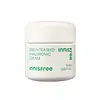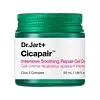What's inside
What's inside
 Key Ingredients
Key Ingredients

 Benefits
Benefits

 Concerns
Concerns

No concerns
 Ingredients Side-by-side
Ingredients Side-by-side

Water
Skin ConditioningPropanediol
SolventGlycerin
HumectantStearyl Dimethicone
EmollientMethyl Trimethicone
Skin ConditioningPentaerythrityl Tetraethylhexanoate
EmollientButylene Glycol Dicaprylate/Dicaprate
EmollientGlyceryl Polymethacrylate
1,2-Hexanediol
Skin ConditioningPolymethylsilsesquioxane
Squalane
EmollientHydroxyethyl Acrylate/Sodium Acryloyldimethyl Taurate Copolymer
Emulsion StabilisingPolyglyceryl-3 Methylglucose Distearate
EmulsifyingCarbomer
Emulsion StabilisingHydrogenated Lecithin
EmulsifyingCholesterol
EmollientGlyceryl Stearate
EmollientTromethamine
BufferingSodium Stearoyl Glutamate
CleansingLactobacillus Ferment Lysate
Skin ConditioningHyaluronic Acid
HumectantPanthenol
Skin ConditioningAllantoin
Skin ConditioningSodium Metaphosphate
BufferingCamellia Sinensis Seed Oil
HumectantCetearyl Alcohol
EmollientXanthan Gum
EmulsifyingGlyceryl Caprylate
EmollientButylene Glycol
HumectantEthylhexylglycerin
Skin ConditioningSorbitan Isostearate
EmulsifyingSodium Hyaluronate
HumectantCamellia Sinensis Leaf Extract
AntimicrobialMadecassoside
AntioxidantLactic Acid
BufferingDextrin
AbsorbentTheobroma Cacao Extract
Skin ConditioningHydrolyzed Hyaluronic Acid
HumectantSodium Hyaluronate Crosspolymer
HumectantCamellia Sinensis Seed Extract
HumectantCeramide NP
Skin ConditioningTocopherol
AntioxidantPhytosphingosine
Skin ConditioningSodium Acetylated Hyaluronate
HumectantWater, Propanediol, Glycerin, Stearyl Dimethicone, Methyl Trimethicone, Pentaerythrityl Tetraethylhexanoate, Butylene Glycol Dicaprylate/Dicaprate, Glyceryl Polymethacrylate, 1,2-Hexanediol, Polymethylsilsesquioxane, Squalane, Hydroxyethyl Acrylate/Sodium Acryloyldimethyl Taurate Copolymer, Polyglyceryl-3 Methylglucose Distearate, Carbomer, Hydrogenated Lecithin, Cholesterol, Glyceryl Stearate, Tromethamine, Sodium Stearoyl Glutamate, Lactobacillus Ferment Lysate, Hyaluronic Acid, Panthenol, Allantoin, Sodium Metaphosphate, Camellia Sinensis Seed Oil, Cetearyl Alcohol, Xanthan Gum, Glyceryl Caprylate, Butylene Glycol, Ethylhexylglycerin, Sorbitan Isostearate, Sodium Hyaluronate, Camellia Sinensis Leaf Extract, Madecassoside, Lactic Acid, Dextrin, Theobroma Cacao Extract, Hydrolyzed Hyaluronic Acid, Sodium Hyaluronate Crosspolymer, Camellia Sinensis Seed Extract, Ceramide NP, Tocopherol, Phytosphingosine, Sodium Acetylated Hyaluronate
Water
Skin ConditioningDipropylene Glycol
HumectantGlycerin
HumectantButylene Glycol
HumectantCaprylyl Methicone
Skin ConditioningPentylene Glycol
Skin ConditioningNiacinamide
Smoothing1,2-Hexanediol
Skin ConditioningCetearyl Olivate
Theobroma Cacao Extract
Skin ConditioningCentella Asiatica Leaf Extract
Skin ConditioningHydrogenated Polydecene
EmollientGlyceryl Caprylate
EmollientAllantoin
Skin ConditioningAsiaticoside
AntioxidantMadecassic Acid
Skin ConditioningAsiatic Acid
Skin ConditioningAdenosine
Skin ConditioningPolyglyceryl-4 Oleate
EmulsifyingSodium Stearoyl Glutamate
CleansingPalmitoyl Tripeptide-8
Skin ConditioningSorbitan Olivate
EmulsifyingC14-22 Alcohols
Emulsion StabilisingTromethamine
BufferingAmmonium Acryloyldimethyltaurate/Vp Copolymer
Acrylates/C10-30 Alkyl Acrylate Crosspolymer
Emulsion StabilisingCarbomer
Emulsion StabilisingBoron Nitride
AbsorbentPropanediol
SolventIsopentyldiol
HumectantDextrin
AbsorbentC12-20 Alkyl Glucoside
EmulsifyingSodium Surfactin
CleansingDextran
Sodium Phytate
CI 19140
Cosmetic ColorantCI 42090
Cosmetic ColorantWater, Dipropylene Glycol, Glycerin, Butylene Glycol, Caprylyl Methicone, Pentylene Glycol, Niacinamide, 1,2-Hexanediol, Cetearyl Olivate, Theobroma Cacao Extract, Centella Asiatica Leaf Extract, Hydrogenated Polydecene, Glyceryl Caprylate, Allantoin, Asiaticoside, Madecassic Acid, Asiatic Acid, Adenosine, Polyglyceryl-4 Oleate, Sodium Stearoyl Glutamate, Palmitoyl Tripeptide-8, Sorbitan Olivate, C14-22 Alcohols, Tromethamine, Ammonium Acryloyldimethyltaurate/Vp Copolymer, Acrylates/C10-30 Alkyl Acrylate Crosspolymer, Carbomer, Boron Nitride, Propanediol, Isopentyldiol, Dextrin, C12-20 Alkyl Glucoside, Sodium Surfactin, Dextran, Sodium Phytate, CI 19140, CI 42090
 Reviews
Reviews

Ingredients Explained
These ingredients are found in both products.
Ingredients higher up in an ingredient list are typically present in a larger amount.
1,2-Hexanediol is a synthetic liquid and another multi-functional powerhouse.
It is a:
- Humectant, drawing moisture into the skin
- Emollient, helping to soften skin
- Solvent, dispersing and stabilizing formulas
- Preservative booster, enhancing the antimicrobial activity of other preservatives
Allantoin is a soothing ingredient known for its protective and moisturizingg properties. Because of this, it is often added to products with strong active ingredients.
Studies show higher concentrations of this ingredient can promote wound healing.
Though it can be derived from the comfrey plant, allantoin is produced synthetically for cosmetic products to ensure purity.
Learn more about AllantoinButylene Glycol (or BG) is used within cosmetic products for a few different reasons:
Overall, Butylene Glycol is a safe and well-rounded ingredient that works well with other ingredients.
Though this ingredient works well with most skin types, some people with sensitive skin may experience a reaction such as allergic rashes, closed comedones, or itchiness.
Learn more about Butylene GlycolCarbomer is a polymer of acrylic acid. Its main role is to create a gel consistency.
A high amount of carbomer can cause pilling or balling up of products. Don't worry, most products contain 1% or less of carbomer.
Dextrin is used to thicken a product and helps bind ingredients together. It is created from starch and glycogen.
As an emulsifier, dextrin prevents ingredients from separating. This helps elongate a product's shelf life.
Studies show coating UV filters with dextrin prevents these ingredients from being absorbed. This helps UV ingredients last longer on the skin.
Learn more about DextrinGlycerin is already naturally found in your skin. It helps moisturize and protect your skin.
A study from 2016 found glycerin to be more effective as a humectant than AHAs and hyaluronic acid.
As a humectant, it helps the skin stay hydrated by pulling moisture to your skin. The low molecular weight of glycerin allows it to pull moisture into the deeper layers of your skin.
Hydrated skin improves your skin barrier; Your skin barrier helps protect against irritants and bacteria.
Glycerin has also been found to have antimicrobial and antiviral properties. Due to these properties, glycerin is often used in wound and burn treatments.
In cosmetics, glycerin is usually derived from plants such as soybean or palm. However, it can also be sourced from animals, such as tallow or animal fat.
This ingredient is organic, colorless, odorless, and non-toxic.
Glycerin is the name for this ingredient in American English. British English uses Glycerol/Glycerine.
Learn more about GlycerinGlyceryl Caprylate comes from glycerin and caprylic acid, a fatty acid from coconut. It has emollient and emulsifier properties.
As an emollient, it helps hydrate your skin. Emollients work by creating a barrier on your skin to trap moisture in, helping to keep your skin soft and smooth.
On the other hand, emulsifiers prevent ingredients (such as oil and water) from separating.
Learn more about Glyceryl CaprylatePropanediol is an all-star ingredient. It softens, hydrates, and smooths the skin.
It’s often used to:
Propanediol is not likely to cause sensitivity and considered safe to use. It is derived from corn or petroleum with a clear color and no scent.
Learn more about PropanediolSodium Stearoyl Glutamate is an emulsifier and helps condition the skin. It is amino acid-based.
In higher amounts, it may act as a cleansing agent.
This ingredient is extracted from the seeds of the cocoa tree.
Cacao seeds contain antioxidants known as polyphenols. These include flavonoids, procyanidins, and epicatechins.
Studies show these polyphenols help improve skin health.
The more famous ingredient from cocoa tree is cocoa butter.
Learn more about Theobroma Cacao ExtractTromethamine helps balance the pH and improve the texture of a product. It is synthetically created.
As an emulsifier, Tromethamine prevents oil and water ingredients from separating. This helps stabilize the product and elongate a product's shelf life. Tromethamine also makes a product thicker.
Tromethamine helps balance the pH level of a product. Normal pH level of skin is slightly acidic (~4.75-5.5). The acidity of our skin is maintained by our glands and skin biome. Being slightly acidic allows our skin to create an "acid mantle". This acid mantle is a thin barrier that protects our skin from bacteria and contaminants.
Oral Tromethanmine is an anti-inflammatory drug but plays the role of masking, adding fragrance, and/or balancing pH in skincare.
1,3-Propanediol, 2-amino-2-(hydroxymethyl)-
Learn more about TromethamineWater. It's the most common cosmetic ingredient of all. You'll usually see it at the top of ingredient lists, meaning that it makes up the largest part of the product.
So why is it so popular? Water most often acts as a solvent - this means that it helps dissolve other ingredients into the formulation.
You'll also recognize water as that liquid we all need to stay alive. If you see this, drink a glass of water. Stay hydrated!
Learn more about Water